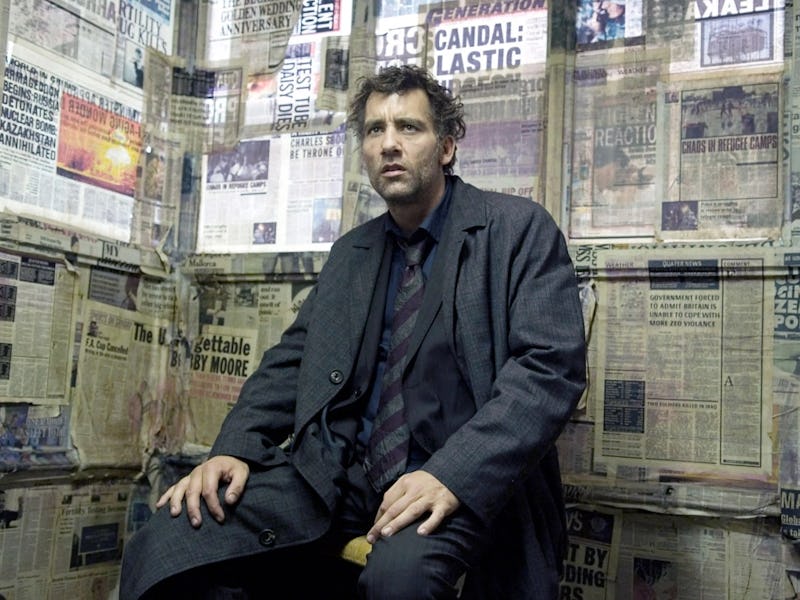The Bleakest Sci-Fi Movie of the 2000s Still Contains a Ludicrous Spark of Optimism
People won’t stop referencing it, so you might as well rewatch it.

It’s tricky to get the tone of a dystopia just right. Done well, they can be searing insights into contemporary inhumanity, but make them too blunt and the lesson becomes ham-handed. A simple premise is usually the most effective; there’s a reason Nineteen Eighty-Four’s story of an authoritarian government is iconic, but a dozen overly-complicated YA dystopias have faded into the history books. “Look how awful humans are once the human experience is completely rewritten to be fundamentally miserable” isn’t much of an observation.
Children of Men’s premise — that humanity has lost the ability to reproduce — is simple, but also inherently ridiculous. It’s not new, either. Frank Herbert dabbled with it, and The Handmaid’s Tale is going to take it to a sixth season of television. Yes, the slow extinction of our species would be a bit of a downer, thanks for pointing that out. But Children of Men works because of its execution, which is both unflinchingly bleak and audaciously optimistic.
It’s 2027, and humanity has been infertile for 18 years. The United Kingdom is one of the few world governments still functioning, but it’s transformed into a police state that brutalizes a flood of refugees seeking shelter. Theo Faron (a bedraggled Clive Owen) is a middle-aged bureaucrat just trying to pay his bills and drink himself to death, but then his ex-wife, Julian (Julian Taylor), now a member of an extremist refugee rights group called the Fishes, asks for his help acquiring transit papers. Theo learns they’re for a teenager, Kee, who’s miraculously pregnant, and he soon gets stuck escorting Kee through a war zone to meet scientists who think they can solve the crisis.
The film’s first half is a slow-burn thriller that introduces us to Theo’s London and the drama he’s been dragged into. The exposition is a little clunky, and the nuances of the Fishes’ plot are a bit ridiculous, but the futuristic yet decaying world feels real. A weary Owen and his aging hippie friend (played by a wonderfully coiffed Michael Caine) sell grim details like government-issued suicide kits without descending into melodrama, and little touches like people spoiling their pets while ignoring the plight of their fellow man give you a sense of where this is going.
Theo only takes Julian’s job for the money but, like countless reluctant protectors of world-saving young women before and after him, he grows attached to Kee and embraces the importance of his mission. He certainly has to be committed to survive what comes next, as the back end of the movie is a ruthless, visceral descent into a refugee concentration camp that explodes into open rebellion.
While Children of Men was nominated for many awards, Michael Caine’s hairstylist was unfortunately not singled out.
Director Alfonso Cuarón wisely eschewed the infamous shaky cam that was becoming all the rage by 2006. He instead filmed several stunning tracking shots, including an absurd yet tense chase involving two barely functional cars, and a visceral firefight that extends for over six minutes. Contemporary reviews lavished praise on Children of Men for these scenes, and it’s easy to see why; they’re nail-bitingly tense but always coherent, a combination that ensures you always know exactly what’s happening, even when there are moments when maybe you’d prefer not to.
Cuarón was inspired by, among other films, 1966’s Battle of Algiers, which takes a documentarian approach to the breakdown of order and the brutal combat that follows. But Cuarón is documenting a fictional world, and there are moments when his film threatens to teeter over into bathos. You can only watch so many civilians be gunned down and bisected bomb victims plead to the camera before it feels like Cuarón is hammering his point into your head. And that point is a bit muddled; Cuarón is right to argue that anti-immigration politics inevitably devolve into horrible dehumanization, but it isn’t shocking to learn that a government facing the greatest crisis in human history would probably be a little harsh. Them’s the breaks.
Prepare for a grimy movie.
Still, it works a hell of a lot more than it doesn’t, and perhaps the fact that its action will burn itself into your brain is why Children of Men is called prescient whenever bad news hits headlines. Brexit, Covid, Trump, and migrant crises all prompted critics to dust the film off and say, “Wow, looks familiar, don’t it?” Certainly, after a summer dominated by terrifying climate change headlines and social media doomsaying, the image of a society on the brink became easier to fantasize about.
But analyzing the specifics of what Children of Men did and did not predict is less instructive than studying its moral, which posits that the most audacious act you can commit amid catastrophe is give a damn. In a world where it’s instinctual to despair, Theo manages to overcome his nihilism and find the tiniest spark of hope.
Religious iconography oozes throughout Children of Men (the title comes from Psalm 90, and P.D. James, who wrote the original novel, was a devout Anglican), and you don’t exactly have to be a theologian to clock the symbolism of a poor young immigrant giving birth to humanity’s savior. Fittingly, after 100 minutes of relentless despair, there is an audacious moment of redemption. The irony of recent headlines lamenting that Children of Men “foresaw a dark future” is that it also saw a way out of the darkness, which is what really makes it worth revisiting today.
Children of Men is streaming on Prime Video.
This article was originally published on